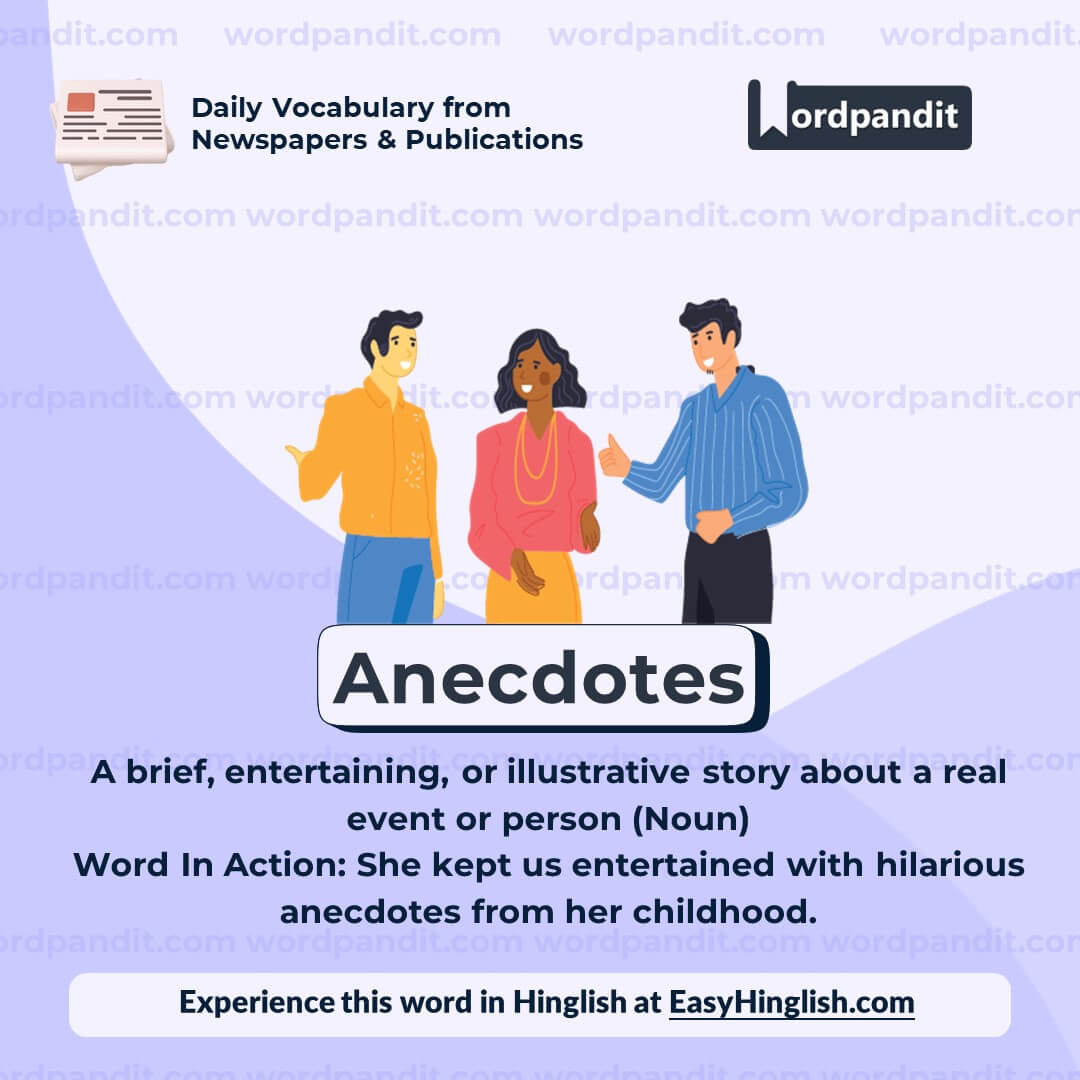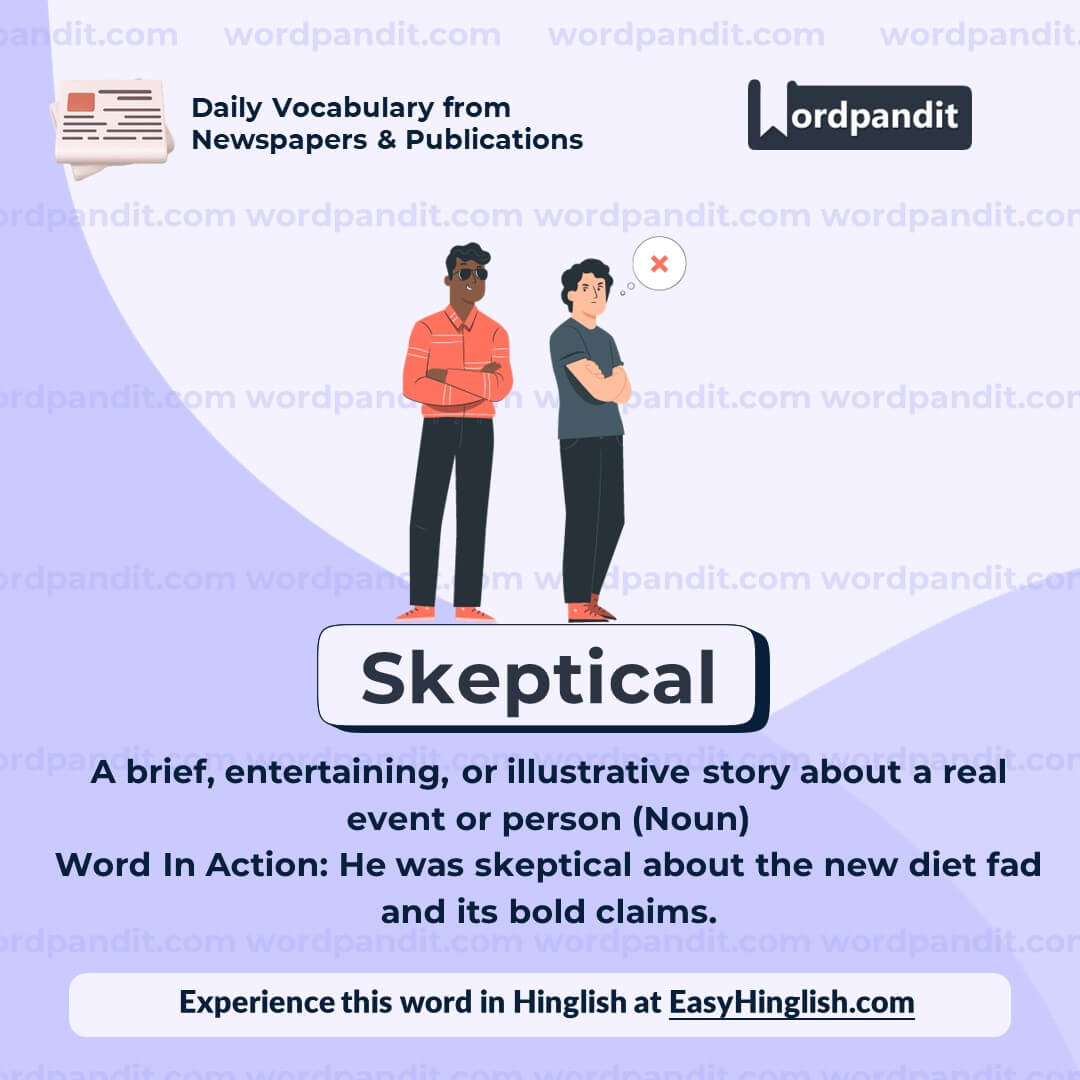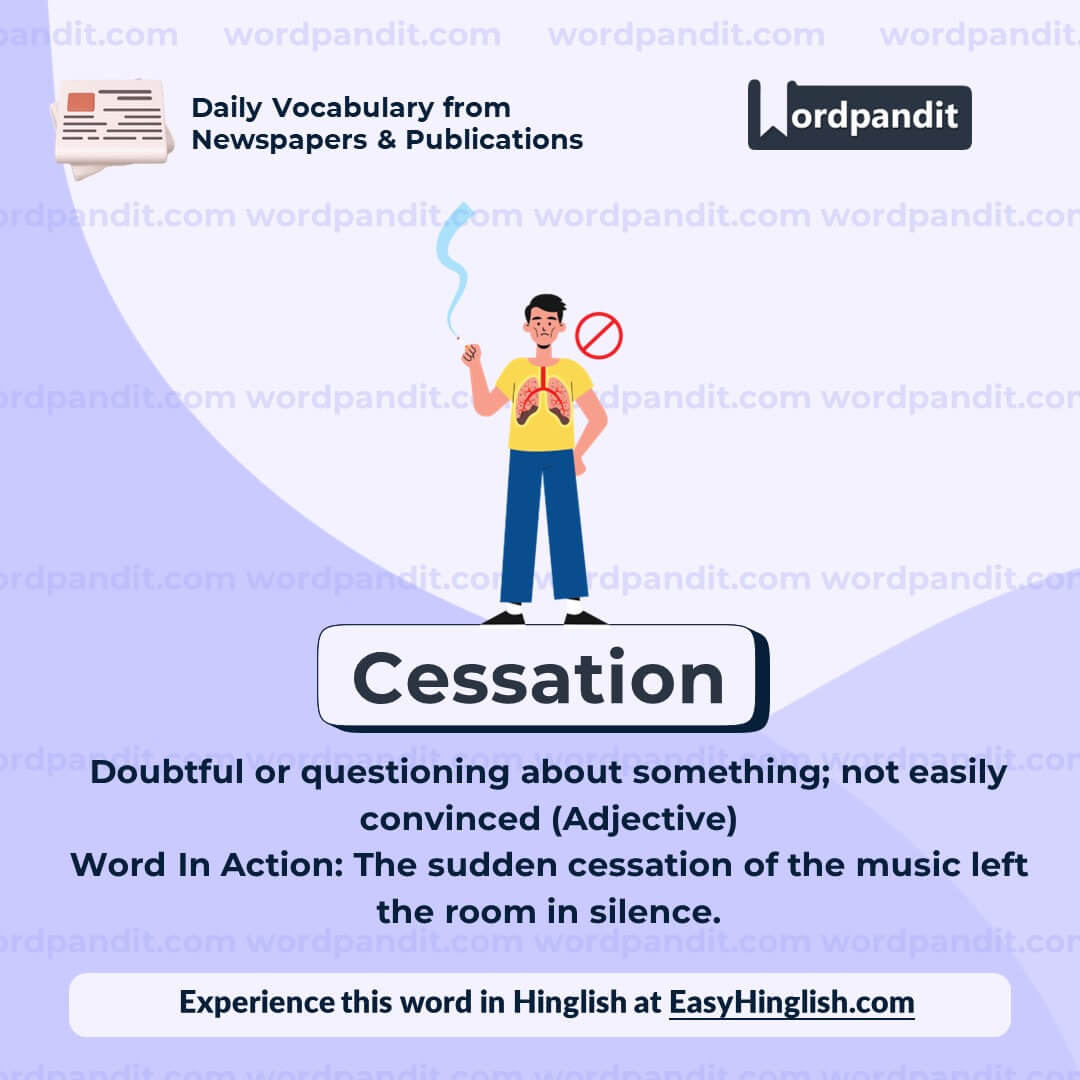Daily Vocabulary from International Newspapers and Publications
Expand Your Vocabulary with Wordpandit’s Global Vocabulary Hub
At Wordpandit, we are committed to helping you develop a truly global vocabulary by drawing from some of the most respected international publications. This section is designed to keep you ahead of the curve by introducing you to words that define global conversations and trends.
The Power of Global Sources
To help you think and communicate on a global scale, we curate vocabulary from renowned international sources, such as:
- The New York Times
- The Washington Post
- BBC
- The Guardian
- The Economist
- Scientific American
- Psychology Today
- And many more...
Stay Global, Stay Competitive
Our daily updates from international publications ensure you are consistently exposed to new words that reflect global news and developments, making sure your vocabulary is not only current but also globally relevant.
Enhance Your Global Perspective
Whether you’re preparing for international exams, aiming to excel in global business communication, or want to enhance your language skills for personal growth, Wordpandit offers the resources you need to thrive in a global context.
Effective Learning, Global Reach
Our learning methodology combines global examples, memory aids, and interactive activities, allowing you to internalize new words effectively and apply them in real-world scenarios.
Begin Your Global Vocabulary Journey Now!
Why Choose Wordpandit?
Practical Learning: Focus on words you'll actually encounter in real-world reading, enhancing your comprehension and communication skills.
Diverse Content: From current affairs to scientific breakthroughs, our varied sources expose you to vocabulary across multiple domains.
Effortless Integration: Make Wordpandit a part of your daily routine. Just a few minutes each day can significantly boost your lexicon over time.
Your Path to Vocabulary Mastery
- Visit our Daily Vocabulary section regularly
- Explore new words and their usage in context
- Practice incorporating these words into your own writing and speech
- Track your progress as your vocabulary expands
Start Your Journey Today
Embark on your vocabulary enhancement journey with Wordpandit. By consistently engaging with our daily posts, you'll build a robust vocabulary that serves you well in academic, professional, and personal contexts.
Remember, a word a day keeps linguistic limitations at bay. Make Wordpandit your daily companion in the quest for vocabulary excellence!
WORD-1: Gaffe
Context:
"The politician's gaffe during the interview was replayed on news channels for days." - Aeon
Explanatory Paragraph:
A "gaffe" is an unintentional mistake, especially a socially awkward or embarrassing remark made in public. It often happens when someone speaks without thinking or misjudges the situation, leading to unintended consequences. In politics, gaffes can damage reputations, as they are widely publicized and scrutinized.
Meaning: An unintentional mistake or blunder, especially one that is embarrassing (Noun).
Pronunciation: Gaf
Difficulty Level: ⭐⭐⭐ Intermediate
Etymology: Originating from French *gaffe* (meaning "clumsy remark or blunder"), it entered the English language in the early 20th century.
Synonyms & Antonyms:
Synonyms: Blunder, mistake, slip-up, faux pas, misstep
Antonyms: Precision, accuracy, diplomacy, tact
Usage Examples:
- The CEO’s gaffe during the press conference led to a drop in stock prices.
- She apologized for her gaffe, realizing her comment had offended many people.
- His gaffe on live television made headlines across the country.
- The comedian’s gaffe turned out to be unintentional, but it still sparked controversy.
Cultural Reference:
"A political gaffe is when a politician tells the truth – some obvious truth he isn't supposed to say." - Michael Kinsley
Think About It:
Do you think a gaffe should define a person's reputation, or should we focus on their overall actions and intentions?
Quick Activity:
Think of a famous public gaffe from history or recent news. What impact did it have on the person or organization involved?
Memory Tip:
Think of "gaffe" as a "goof-up" in speech – both words start with "G" and describe embarrassing mistakes.
Real-World Application:
Understanding gaffes is essential in public speaking, leadership, and communication. Learning how to handle and recover from a gaffe gracefully can make a significant difference in personal and professional settings.
WORD-2: Pedantic
Context:
"Meanwhile, many humanities scholars see scientists as pedantic surveyors of nature, who may produce practical and useful results." - Aeon
Explanatory Paragraph:
The word "pedantic" describes someone who is overly concerned with minor details, formal rules, or academic precision, often to the point of being tiresome. A pedantic person tends to focus on trivial aspects of knowledge rather than the bigger picture, sometimes making them seem arrogant or out of touch with practicality.
Meaning: Excessively concerned with minor details or rules; overly scholarly (Adjective).
Pronunciation: puh-DAN-tik
Difficulty Level: ⭐⭐⭐ Intermediate
Etymology: Derived from the word "pedant," which comes from the Italian *pedante* (teacher), originally from the Greek *paideuein* (to educate).
Synonyms & Antonyms:
Synonyms: Over-scrupulous, finicky, fussy, nitpicky, dogmatic
Antonyms: Open-minded, broad, informal, unpretentious
Usage Examples:
- The professor’s pedantic explanations made even simple concepts seem complicated.
- She had a pedantic habit of correcting everyone’s grammar, even in casual conversations.
- His pedantic approach to cooking meant he spent more time measuring ingredients than actually preparing the meal.
- The debate quickly became tiresome due to the pedantic arguments over definitions.
Cultural Reference:
In literature, the character of Mr. Collins in *Pride and Prejudice* is often seen as pedantic due to his excessive focus on formalities and social rules.
Think About It:
Is being pedantic always a bad thing, or can it be useful in certain situations, such as scientific research or law?
Quick Activity:
Think of a time when someone was pedantic in a conversation with you. How did it make you feel? Did it help or hinder the discussion?
Memory Tip:
Remember "pedantic" by thinking of a "pedant" as someone who "pads" their speech with excessive details and unnecessary corrections.
Real-World Application:
Understanding when to be precise and when to be flexible is crucial in communication. In professions like law, medicine, and academia, attention to detail is essential, but in everyday interactions, excessive pedantry can be frustrating.
WORD-3: Anecdotes
Context:
"Snow substantiated his diagnosis with anecdotes of respected literary intellectuals who complained about the illiteracy of the scientists but who themselves had never heard of such a fundamental statement as the second law of thermodynamics." - Aeon
Explanatory Paragraph:
An "anecdote" is a short, interesting, or amusing story about a real event or person, often used to illustrate a point or entertain an audience. Anecdotes are commonly used in conversations, speeches, and writing to make ideas more relatable and engaging. While they can be factual, they often focus on personal experiences and may not always provide concrete evidence.
Meaning: A brief, entertaining, or illustrative story about a real event or person (Noun).
Pronunciation: AN-ik-dohts
Difficulty Level: ⭐⭐ Beginner
Etymology: From the Greek *anekdota*, meaning "unpublished things," later adopted into French and English in the 17th century.
Synonyms & Antonyms:
Synonyms: Story, tale, narrative, account, recollection
Antonyms: Data, statistics, analysis, report
Usage Examples:
- During the presentation, she shared anecdotes from her travels to illustrate her points.
- His anecdotes about life in the military kept the audience entertained for hours.
- The professor used historical anecdotes to make the lecture more engaging.
- While the politician’s anecdotes were inspiring, they lacked factual support for his claims.
Cultural Reference:
Mark Twain, known for his wit, was a master of using anecdotes in his writings and speeches, making his social critiques both humorous and thought-provoking.
Think About It:
Do you think anecdotes are more persuasive than statistics? Why or why not?
Quick Activity:
Write a short anecdote about a funny or memorable moment in your life. Try to keep it engaging and descriptive!
Memory Tip:
Think of "anecdote" as a "little note"—a short story or remark that captures a moment or idea in an interesting way.
Real-World Application:
Anecdotes are widely used in storytelling, marketing, and public speaking to create emotional connections and make messages more memorable.
WORD-4: Skeptical
Context:
"She was skeptical of the new policy because previous attempts had failed to deliver the promised results." - Aeon
Explanatory Paragraph:
The word "skeptical" describes a person who is doubtful or hesitant to believe something without sufficient evidence. A skeptical individual questions claims, challenges assumptions, and requires logical reasoning or proof before accepting an idea. While skepticism is valuable for critical thinking, excessive skepticism can sometimes lead to distrust or reluctance to accept well-supported facts.
Meaning: Doubtful or questioning about something; not easily convinced (Adjective).
Pronunciation: SKEP-ti-kuhl
Difficulty Level: ⭐⭐⭐ Intermediate
Etymology: Derived from the Greek *skeptikos*, meaning "thoughtful, inquiring," and later adopted into Latin and English.
Synonyms & Antonyms:
Synonyms: Doubtful, questioning, uncertain, suspicious, hesitant
Antonyms: Trusting, convinced, certain, gullible, accepting
Usage Examples:
- Many scientists remain skeptical of claims that lack empirical evidence.
- She was skeptical about investing in the new startup, fearing it was too risky.
- Despite the advertisement’s promises, he remained skeptical about the product’s effectiveness.
- His skeptical attitude toward government policies led him to research the data before forming an opinion.
Cultural Reference:
Philosopher René Descartes is known for his skeptical approach to knowledge, famously stating, "I think, therefore I am," emphasizing the importance of questioning everything.
Think About It:
Is skepticism always beneficial, or can it sometimes prevent people from accepting important truths?
Quick Activity:
Think of a time when you were skeptical about something. Did your skepticism turn out to be justified? Write a short reflection on your experience.
Memory Tip:
Think of "skeptical" as someone who says, "Skip the belief, I need proof!"
Real-World Application:
Skepticism is essential in fields like journalism, science, and law, where questioning assumptions and verifying facts are critical to making informed decisions.
WORD-5: Cessation
Context:
"The government announced a cessation of hostilities to negotiate peace." - BBC
Explanatory Paragraph:
The word "cessation" refers to the act of stopping something, either temporarily or permanently. It is often used in formal contexts, such as ceasefires in conflicts, medical treatments, or the ending of activities like smoking. A cessation implies an intentional halt rather than a gradual decline.
Meaning: The act of stopping or bringing something to an end (Noun).
Pronunciation: seh-SAY-shun
Difficulty Level: ⭐⭐⭐ Intermediate
Etymology: From Latin *cessatio*, meaning "delay or stopping," derived from *cessare*, meaning "to cease."
Synonyms & Antonyms:
Synonyms: Termination, halt, discontinuation, stoppage, suspension
Antonyms: Continuation, persistence, resumption, prolongation
Usage Examples:
- The doctor recommended a complete cessation of smoking to improve his health.
- The two countries agreed to a temporary cessation of hostilities to allow humanitarian aid.
- The unexpected cessation of funding forced the company to shut down its operations.
- After years of protests, the factory announced the cessation of harmful chemical emissions.
Cultural Reference:
The "Cessation of Transatlantic Slave Trade Act" of 1807 marked a significant step toward abolishing slavery in Britain and its territories.
Think About It:
Do you think a cessation of social media use could improve mental health, or would it create new challenges?
Quick Activity:
List three situations where a cessation would be beneficial. Explain why stopping the activity would have a positive impact.
Memory Tip:
Think of "cessation" as "cease-action"—when an action stops completely.
Real-World Application:
Cessation is frequently used in medical and diplomatic discussions, such as smoking cessation programs or peace negotiations between nations.

















